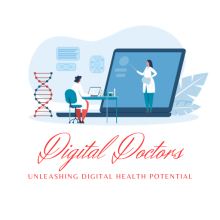Inspirational journeys
Follow the stories of academics and their research expeditions
Digital Health Transformation: Unlock Your Business Potential Through Innovation

Abstract
Digital health transformation is revolutionizing how healthcare systems operate globally, offering opportunities for improved patient care, operational efficiency, and business growth. From telemedicine and electronic health records (EHRs) to artificial intelligence (AI) and wearable technologies, digital innovation is driving health accessibility and scalability, especially in under-resourced regions like Africa. This white paper explores how healthcare businesses can unlock their full potential through digital innovation. It presents real-world case studies, including successful transformations in Kenya, Rwanda, and Nigeria, and offers practical recommendations for implementation.
Introduction
The 21st-century healthcare sector is undergoing an unprecedented transformation, fueled by the rapid adoption of digital technologies. Amid challenges such as aging populations, rising healthcare costs, and staff shortages, digital health innovation offers solutions that were once unimaginable. More than a technological shift, it represents a fundamental redesign of healthcare delivery and business operations.
The global digital health market was valued at over USD 330 billion in 2022 and is projected to exceed USD 900 billion by 2030 (Statista, 2023). From large hospitals to rural clinics, digital transformation is enabling improved patient outcomes, cost savings, and new business models.
Key Pillars of Digital Health Transformation
1. Telemedicine and Virtual Care
Virtual consultations and telehealth platforms have bridged the distance between patients and providers, especially in underserved regions.
2. Electronic Health Records (EHRs)
EHRs enhance data accessibility and continuity of care, reducing duplication and medical errors.
3. Mobile Health (mHealth) and Wearables
Apps and wearable devices empower patients to monitor and manage chronic conditions such as diabetes and hypertension.
4. Artificial Intelligence (AI) and Big Data Analytics
Predictive analytics and AI-driven diagnostics improve accuracy, reduce costs, and personalize care.
5. Interoperability and Health Information Exchange (HIE)
Interoperable systems ensure seamless data flow across platforms, supporting coordinated care.
Case Study 1: Rwanda’s Telemedicine Leap with Babylon Health
Context: Rwanda has a population of 13 million, with limited access to specialist care in rural regions.
Solution: The Rwandan Ministry of Health partnered with Babylon Health, a UK-based digital health company, to launch a mobile-based telemedicine service called Babyl.
Impact:
-
Over 3 million users registered, accounting for nearly 25% of Rwanda’s population.
-
Reduced the need for physical travel to clinics.
-
Lowered patient waiting times and improved triage.
Key Learning: Government and private sector collaboration can scale access to care in remote settings using simple mobile platforms.
Case Study 2: Kenya’s M-TIBA: Health Savings and Insurance on Mobile
Context: Access to affordable healthcare and insurance remains a challenge for millions of Kenyans.
Solution: M-TIBA, developed by PharmAccess, CarePay, and Safaricom, allows users to save, send, and spend funds for healthcare via mobile phones.
Impact:
-
Over 4 million Kenyans registered.
-
Enabled real-time claims processing and transparency.
-
Promoted health financing inclusion for the uninsured.
Key Learning: Mobile health wallets create a sustainable pathway for universal health coverage (UHC) in low-resource settings.
Case Study 3: Nigeria’s 54gene and Genomic Innovation
Context: African populations are underrepresented in global genomic data, impacting the efficacy of treatments.
Solution: 54gene, a health tech startup in Nigeria, is building the continent’s largest biobank, using advanced digital platforms for genomic sequencing and research.
Impact:
-
Improved genomic understanding for African populations.
-
Attracted global research collaborations and funding.
-
Advanced precision medicine efforts.
Key Learning: Digital health innovation is not limited to service delivery but extends to cutting-edge biomedical research.
Benefits of Digital Health Transformation for Businesses
-
Cost Efficiency: Automation and digital workflows reduce administrative burdens and unnecessary procedures.
-
Scalability: Virtual services can expand to reach national or global audiences with minimal physical infrastructure.
-
Improved Patient Engagement: Mobile tools encourage proactive health behaviors and loyalty.
-
Data-Driven Decisions: Analytics enable businesses to optimize services and forecast demand.
-
New Revenue Streams: Subscription models, remote monitoring services, and digital therapeutics open new income channels.
Challenges to Consider
-
Digital Divide: Uneven access to smartphones and internet connectivity can exclude vulnerable populations.
-
Data Privacy and Security: Ensuring compliance with regulations such as HIPAA and GDPR is essential.
-
Health Worker Training: Digital literacy among healthcare professionals must be strengthened.
-
Cultural Resistance: Adoption requires trust and patient education.
Strategic Recommendations
-
Start with Scalable Pilots: Begin with targeted use cases such as appointment scheduling or digital triage.
-
Invest in Interoperable Systems: Future-proof your business with platforms that communicate across ecosystems.
-
Co-create with End-Users: Involve patients and clinicians in the design process to ensure usability.
-
Leverage Public-Private Partnerships (PPPs): Collaborate with governments, telecoms, and insurers to broaden impact.
-
Monitor, Evaluate, and Adapt: Use KPIs and real-time data to assess effectiveness and iterate.
Conclusion
Digital health transformation is more than a trend—it is a necessary evolution in healthcare business strategy. Whether in bustling urban hospitals or rural clinics in Africa, digital innovation is unlocking new possibilities. Businesses that invest wisely in technology, partnerships, and capacity-building will not only improve patient outcomes but also secure long-term growth and resilience in a fast-changing world.
References
Babylon Health. (2022). Babyl Rwanda Case Study. https://www.babylonhealth.com
CarePay. (2023). M-TIBA: Mobile Health Wallets in Kenya. https://www.mtiba.com
54gene. (2023). Transforming African Genomics. https://www.54gene.com
Statista. (2023). Digital Health Market Size Worldwide 2022-2030. https://www.statista.com
World Health Organization (WHO). (2022). Global Strategy on Digital Health 2020–2025. https://www.who.int
Tags:
digital health transformation telemedicine mobile health healthcare innovation health tech Africa EHR AI in healthcare digital health business M-TIBA 54gene Babylon Health Rwanda healthcare startups remote healthcare healthcare digitalization patient-centered innovation0 Comments
Categories
- Career Development and Opportunities in Digital Health 166
- White Papers 39
- IELTS For Medical Professional 35
- OET Exam Preparation 30
- Entrepreneurship and Innovation 26
- Healthcare Innovation 17





Leave a comment